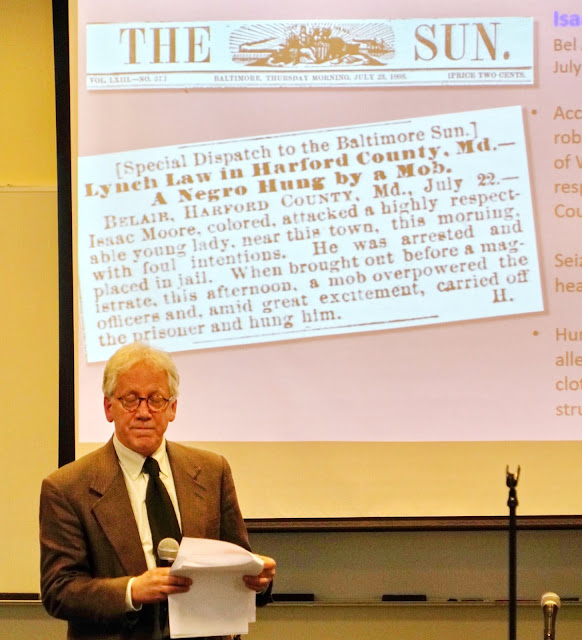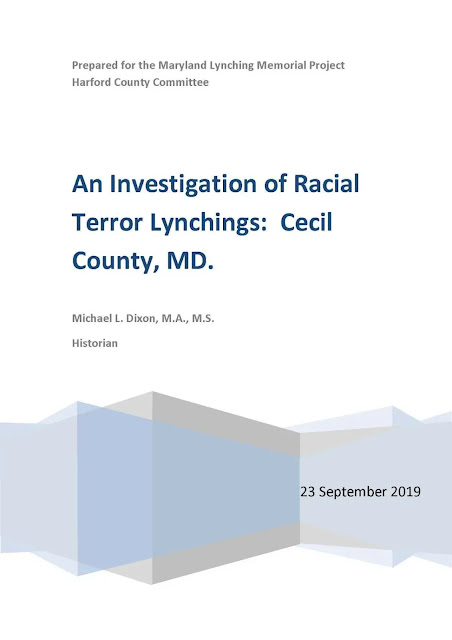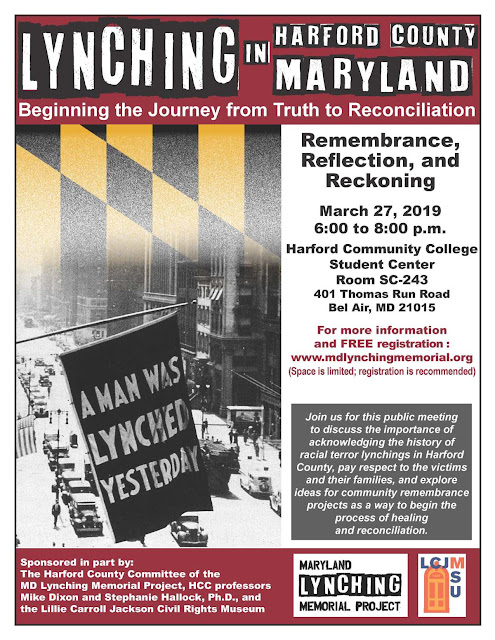 |
| The Harford County Courthouse in the spring (Source: Mike Dixon, April 26, 2016) |
Thursday, April 16, 2020
Remembrance Ceremony & Soil Collection Canceled
The HarfordCounty Remembrance Ceremony & Soil Collection was shceduled for Saturday, March 28, 2020. But the COVID-19
Pandemic has affected countries all over the world including here in Harford
County. As a result, the Rembrance
Ceremony is postponed until further notice.
We will notify you when we
have rescheduled the Ceremony.
To continue to support our efforts,
donations can still be made by going to https://www.mdlynchingmemorial.org/ and
scrolling down to the Harford County link on the right, which will ensure your
donation comes to HarCo MLMP. We appreciate your continued
support and ask that you take the necessary steps to safeguard your health and
that of your loved ones.
 |
| The Harford County Courthouse on a snowy November day (Source: Kyle Dixon, Nov. 26, 2014) |
Committee Documents Tragic Harford County Crimes
The research committee spearheaded by Lisa Tuso has researched this tragic period in Harford County. Working with newspapers, criminal justice records, coroner's reports, and family history sources, the committee has documented the following occurrences:
RESEARCH SUBCOMMITTEE ADDS DETAILS
RESEARCH SUBCOMMITTEE ADDS DETAILS
Cecil County Lynchings - A Dark Chapter in the Past
The Maryland Lynching Memorial Project is working to open a
discussion about a violent chapter in Maryland’s past, racial terror lynchings. These troubling incidents have not generally been studied or documented so little is know about this grim history. Thus, the project is working to address this gap in our understanding of these episodes of mob violence.
In Cecil County, local knowledge of these tragic events was not brought down to the twentieth century, the subject not being taken up by local historians, journalists, or heritage groups. As memory of the 19th-century episodes quickly faded and one generation gave way to another, the narratives related to the troubling violence hastily disappeared from the collective memory and history.
One of the goals of the Harford County Committee is to urge the formation of a committee for Cecil County. Thus the committee did research to answer questions focused on how many killings occurred there and develop historical narratives associated with mob violence. The investigation concluded that at least two lynchings occurred in Cecil County.
In Cecil County, local knowledge of these tragic events was not brought down to the twentieth century, the subject not being taken up by local historians, journalists, or heritage groups. As memory of the 19th-century episodes quickly faded and one generation gave way to another, the narratives related to the troubling violence hastily disappeared from the collective memory and history.
One of the goals of the Harford County Committee is to urge the formation of a committee for Cecil County. Thus the committee did research to answer questions focused on how many killings occurred there and develop historical narratives associated with mob violence. The investigation concluded that at least two lynchings occurred in Cecil County.
- On September 26, 1861, an enslaved 14-years-old-boy belonging to Capt. Matthew Carroll Pearce was arrested near Cecilton (perhaps the Earleville area) for allegedly attempting to rape a young 14-year-old girl. He was arrested and taken to Cecilton where one newspaper reported that the matter was investigated. He was then taken to a tree in the vicinity of the act and hung. Another narrative reports that the citizens of Cecilton seized Frederick and hanged him from the nearest tree. The location of this extrajudicial hanging was between Cecilton and Earleville, in Sassafras Neck.
- Around the 9 o’clock hour on the evening of July 29, 1872, John Jones was taken from the custody of a special constable and lynched, alongside the old Telegraph Road a short distance south of the community of Pivot Bridge on the C & D Canal. When the Cecil County Sheriff and Deputy arrived early the next morning, Jones was found swinging from a small hickory tree near a fruit farm. The coroner’s jury rendered a verdict of “death by hanging at the hands of persons unknown to the jury.” This remains an unsolved murder. The location of the 1872 murder is on the old telegraph road not too far south of the present-day Bethel Cemetery along the C & D Canal. At the time of the incident, there was a small village on the canal known as Pivot Bridge.
A Push for Rememberance of Lynching Viuctims and Reconcilitation During Event at Harford Community College
Baltimore Sun, March 28, 2019
by David Anderson
by David Anderson
Many families in the U.S., whose ancestors were victims of racially
motivated lynchings in the late 19th and early 20th centuries, still
carry the trauma of those lynchings, generations after they happened.
Karla Wynn, who attended a public meeting Wednesday evening in the
Student Center at Harford Community College to cover the history of
lynchings in Maryland and remember the victims, said many families whose
ancestors were lynched do not talk about it, even today.
Harford County Memorial Project Meets for the First Time.
HARFORD COMMUNITY COLLEGE, March 25, 2019 -- Wednesday evening, the Harford County Committee of the Maryland Lynching Memorial Project met to discuss the importance of acknowledging the history of racial terrorism in Harford County. The meeting explored ideas for community remembrance projects as a way to begin the process of healing and reconciliation.
Dr. Iris Barnes, the curator of the Lillie Carroll Jackson Civil Rights Museum at Morgan State University and the chair of the Harford County Committee, welcomed about 40 guests to the meeting.
The names of victims in lynchings in Harford County were read and there was a moment of silence: Isaac Moore in Bel Air on July 22, 1868; An unknown victim in August 1868; Jim Quinn in White Hall on October 2, 1869; and Lewis Harris in Bel Air on March 27, 1900.
For more information on the Maryland Lynching Memorial Project check out this Facebook page.
For additional photographs of the first meeting check out this Facebook page.
For additional photographs of the first meeting check out this Facebook page.
 |
| Will Schwarz, chairman of the state committee, welcomes the audience |
 |
| Dr. Iris Barnes, chair for the Harford County Committee, welcomes about 40 people to the first meeting. |
 |
| Harford County Community College's Dr. Stephanie Hacllock offers remarks. |
Beginning the Journey From Truth to Reconciliation: The Harford County Committee
Between the end of the Civil War and the beginning of World War II, more than 5,000 black Americans were victims of racial terror lynchings in the United States. No fewer than 40 of these crimes were committed in Maryland, including at least four in Harford County
As part of beginning a journey from truth to reconciliation, the Harford County Committee of the Maryland Lynching Memorial Project first met on March 27, 2019, to discuss the importance of acknowledging the history of racial terrorism in our county. The Committee explored ideas for community remembrance projects as a way to begin the process of healing and reconciliation. The program included two short films, presentations and community discussion, and complimentary literature from the Equal Justice Initiative was available.
On this evening at the end of March 2019, a large group of interested stakeholders attended the first public to discuss lynching in Harford County, along with the importance of acknowledging the history of racial terror, pay respect to the victims, and their families, and explore ideas for community remembrance projects as a way to begin the process of healing.
Out of this initial meeting on March 27, 2019, a group of volunteers agreed to form the Harford County Committee to complete the journey from truth to reconcilitation.
Subscribe to:
Posts (Atom)


